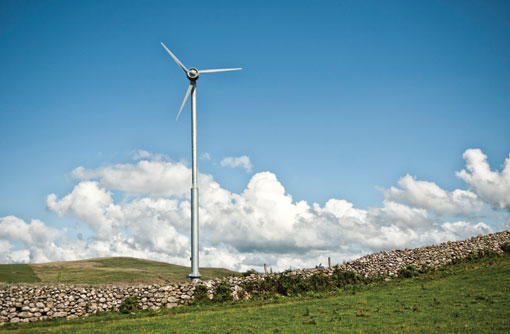Carefully assess wind turbine developers’ terms

Many turbine developers are seeking sites for wind turbines because of the great returns available from the Feed-In Tariff. Most employ a ‘scattergun’ approach by sending out letters to hundreds of landowners in the hope of finding a few feasible sites and paying the site owner an annual rental.
With the sums on offer, it can be tempting to sign up to heads of terms straight away on the promise of a guaranteed income for 20-25 years. However, be careful, as you may be at the bottom of a long list of potential site owners. By the time the developer researches the feasibility of your site, you could have been tied in for many months, unable to talk to other developers or consider other options.
It is well worth doing some homework first. When talking to a developer, you are in a strong position to negotiate. If you find one developer difficult to deal with, remember there are others in the marketplace so it is sensible to shop around before signing anything.
You need to consider the following options:
- Would you prefer a straightforward flat fee arrangement that is payable annually? Will it be index-linked? The payment will be taxable. What impact will it have on your existing tax arrangements?
- It may be worth negotiating an annual rental fee plus a percentage of the Feed In Tariff and/or use on farm of the electricity being generated – either free or at a set cost per kWh.
- Joint ownership is another option. If you would like to invest in the project yourself alongside the developer, you will receive considerably more income from tariff payments, while taking on less risk than by going along the self-funded route.
A word of caution
If you’re considering going ahead, before meeting with the developer it may be worth getting independent advice and guidance from a specialist land agency or renewable energy consultant who has an overview of the wind turbine marketplace in your area and may be able to offer an alternative, more beneficial option.
They should be able to advise you of local issues, such as grid capacity, radar and airport problems, or tell you about agricultural loans, better offers being made to others or shared risk options.
Remember, before signing any legally binding contract, it is vital to get your own unbiased legal advice so do consult a reputable lawyer.
And if you are already tied in to a developer but are unhappy with what is being offered, take legal advice. There may be a “cooling off period” in the contract, during which you can change your mind.
The self-funding option
Self-funding can bring financial risk but can also lead to very good financial returns.
Lenders are keen to lend and interest rates are attractive, but high street banks are not keen to lend against the Feed-In Tariff, nor will they take power purchase income from the turbine into account. Security will need to be provided, normally in the form of land and/or property.
Power purchase is when there is any power left over from what you send to the grid and what you use for your own supply. You can either sell this back to the government at the minimum government rate, or you can sell it independently to a power supplier and negotiate a rate agreement. This is the power purchase income.
There are many potential constraints – wind speed, grid connection, local opposition, aviation objections and many more. Self- funding means you’re tackling these issues on your own unless you take specialist advice from a renewables consultant at different phases of the project. If you’re looking at a smaller scheme, your turbine installer may also be able to help you with some of these issues, although expert, impartial advice and local knowledge is still the best options.
If you’ve had one letter through the door from a turbine developer, the chances are there will be lots more from other developers to follow, so whatever you do, don’t accept the first offer, even if it does seem to promise untold wealth. Do some research online, get recommendations from people you know who have already installed a turbine and talk to your land agent at an early stage.
Farmland sought for new wind turbine scheme
